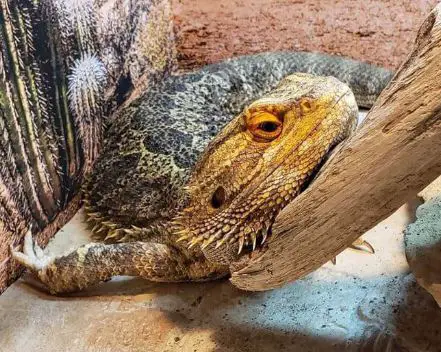Is your bearded dragon not eating or pooping?
Raising a beardie is not easy at all, and most pet owners often run into many difficulties with health problems. The issue of your bearded dragon not eating or pooping is one of them, which puzzles pet owners so much.
A beardie that maintains good digestion and stays healthy should eat and poop regularly. Therefore, there must be some underlying reasons when he is not eating or pooping.
In this article, we will discuss some possible reasons why the bearded dragon isn’t eating or pooping as well as answer some frequent questions relating to this issue.
Related Posts:
How Often Should a Bearded Dragon Poop?
The frequency will depend on many factors, including age, diet, and so on.
Firstly, we can determine how often he should poop due to their age.
While a healthy baby beardie (3 months old or younger) will poop at least once a day or even up to three times per day as he or she consumes protein-rich food daily, an adult beardie (older than 18 months) that lives in favorable conditions with adequate UVA and UVB levels can be expected to poop 1-7 times a week.
It is common for young or juvenile beardie to have a bowel movement every other day.
If you still consider how old your dragon is, this chart will give information about their ages based on their lengths so you can guess their age.
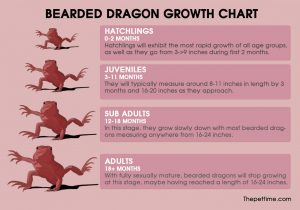
It is just a reference. Bearded dragons’ growth depends on diet, habitat, disease, and beardie breed.
The diet will make a contribution to the frequency of the beardie’s pooping.
For example, he consumes feeder insects that will defecate almost every day.
By contrast, he eats mostly greens, so he won’t often have a bowel movement.
Another factor that will also affect bowel movements is the level of UVA and UVB exposure to beardie experiences.
Why Is Your Bearded Dragon Not Eating or Pooping?
1. You Feed Improperly
Although he is an omnivore, this doesn’t mean he can eat everything, and many pet owners find it too complicated to give their healthy and balanced diets.
A diet is so important as it can decide whether he is healthy or unhealthy, active or inactive, and even alive or dead.
Below are some common mistakes that you can have when feeding your beardie, affecting his bowel movements.
a. Not Eating Enough Food to Poop
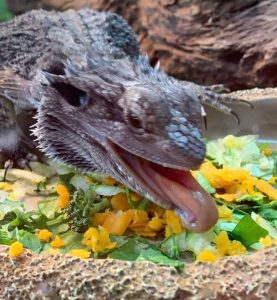
The first reason is, he is not eating enough.
Firstly, you should know that it is common for small baby beardie of up to 16 weeks of age to eat 3 to 4 times a day while juveniles of up to 28 weeks can eat twice a day, and once a day in the case of all adults above that age.
There are some reasons why he is not eating, including both external and internal problems.
Low or very high temperatures in the tank can cause them to reject food.
In case of very high temperatures, he is more likely to suffer from stress, which leads to some kinds of behavior such as escaping, scratching the glass, and digging while lethargy or indigestion can be an indication of low temperatures.
Very high or low humidity is also the culprit for them not eating.
For example, bacteria and fungi can grow in high humidity, which leads to susceptibility to parasitic infections.
A very small tank could be also considered as a problem leading to pooping issues.
Also, most females that are gravid refuse to eat food until the end of gravidity.
In the period of brumation, he might be lethargic, eat little or nothing, and spend time sleeping a lot.
Another reason is that he may be stressed due to frequent setup changes.
Internal parasites, other health issues, or even cage mate bullying might also result in not eating.
Your bearded dragon not eating or pooping will definitely worry you so much, so please consider all the reasons and changes and see the vet if necessary.
b. Too Much Salad in the Diet
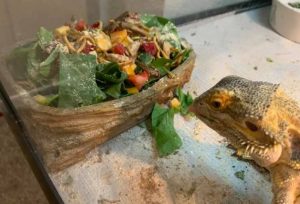
To have a balanced and healthy diet is not easy at all. There are some cases that the pet owner includes too much salad in the diet, which leads to bearded dragons not eating or pooping.
A salad bowl in the tank all the time will be useful for the baby and young beardie (0 to 7 months) so that he will start trying greens at a young age.
Otherwise, when he becomes a juvenile and an adult, he will be a picky eater.
The standard diet for a beardie over 7 months old includes insects 3 times a week, and salad 4 times a week. A beardie turning 18 months old needs salad 5 times a week and bugs only 2 times a week!
Also, overdoing with some vegetables or greens is not recommended.
There are some too many watery vegetables and greens, which can cause diarrhea or even more serious dehydration.
c. Feeding Too Much
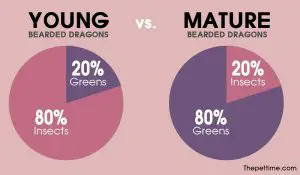
Another mistake that you can make is feeding them too much, which can lead to bearded dragons not eating or pooping as he can get impacted by too many insects, which has a negative impact on their digestive system, and lead to impaction or also diarrhea.
The fact that he is impacted by feeder insects that are just too big for him is quite common.
There are some cases that reptiles cannot digest their food anymore and the insect comes out undigested, which is very harmful to the reptile.
Therefore, you had better not feed them too many insects a day.
Another resulting consequence is that he can suffer from obesity from eating too much.
Also, too many bugs can cause impaction and paralysis.
It is recommended that adult beardie should not eat 30 to 40 feeder insects per week, and around 10 to 20 crickets per 15-minute feeding, for example, is common.
Especially, you shouldn’t feed them more than 10 high-chitin or fatty bugs per day, such as superworms.
The components of the diet for them vary for different ages.
In particular, beardie after 18 months of age should eat 15 to 30% insects and 70 to 85% veggies while it is better for baby beardie to eat 20 to 40% greens and lots of bugs — 60-80%. In the case of a juvenile, 50% of insects and 50% of greens is optimal.
If you don’t follow this, a lot of problems relating to digestion and kidneys will happen.
Related Posts:
- Can Bearded Dragons Eat Rosemary?
- Can Beardies Eat Brussel Sprouts?
- Do Beardies Eat Peas?
- Can Beardies Eat Squash?
- Can Beardies or Dogs Eat Pears?
2. Dehydrated
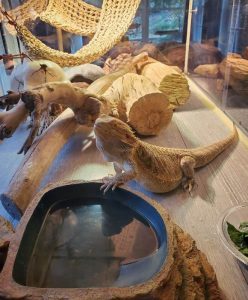
One culprit for the bearded dragon not eating or pooping is that he is dehydrated. As you know, water and essential hydration play an important role in the process of digestion and the moving of fecal mass in the intestines.
There are some symptoms of dehydration such as sunken eyes and loose skin (not very elastic).
Also, thicker saliva and poor appetite would be signs of dehydration.
Especially, you can realize that urates (the white part of the poop) will be harder as well as smaller or missing.
There are some cases that you put the bowl of water in the tank but he doesn’t drink enough water.
Therefore, you can try putting a drop of water on their nose as well as misting the tank a few times a week.
You should get a small dispenser or fountain, which can create moving water and attract them to drink more.
Giving them a bath is also an efficient way to help with hydration. Bathe them at least 1 to 2 times a week for extra moisture.
Also, you can help to get more moisture by offering then salad at all times.
Read More:
- Reasons Why Your Beardie Turned White and Died
- Can Beardies Get High?
- Why Does My Beardie Stare at Me?
- Can Beardies Eat Radish Greens?
3. Lazy or Lethargic
If he is lazy or inactive, it can lead to problems such as not pooping regularly as activity helps promote healthy digestion.
Therefore, it is better for you to get him involved in activities.
For example, some accessories can be introduced to encourage them to move around so that they can climb to a lounger or go for a walk.
4. Low Temperatures and Lack of Lighting in a Cage
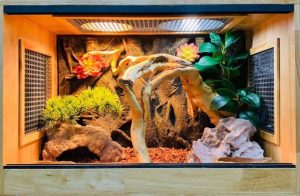
If the bearded dragon is not eating or pooping, this can come from low temperatures in the tank as he is a desert lizard, and very low temperatures will prevent them from having a healthy gut and digesting the food efficiently.
This will result in constipation, low energy levels, and low appetite.
Besides low temperatures, lack of lighting can result in them not eating or pooping as he needs UVB light to produce vitamin D for their development, and it is better to get both UVA and UVB lighting for around 10 to 12 hours every day.
Due to their cold-blooded nature, many dragons won’t eat until he is warm enough to ensure successful digestion.
A lack of correct lighting can also cause feeding issues.
It would be ideal to have temperatures between 92 to 110 degrees F (33° to 43°Celsius) in the hot basking spot under the lights and 75° to 85°F (23.8° to 29°C) in the cool spot while at night, temperatures of 65° to 70°F (18.3° to 21.1° Celsius) are ideal.
In case temperatures at night in the cage decrease dramatically, use an additional heating source to keep stable temperatures.
Any heat rocks and under-tank heaters are not recommended as he can get burnt easily.
We also would like to recommend the ReptiSun 10.0 bulb as it provides a higher amount of UVB, which is more suited for them.
5. Impacted or Constipated
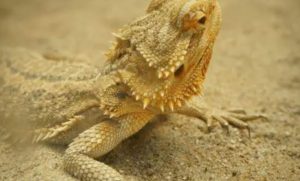
Many become impacted due to loose substrate, random objects, or large feeder insects. Many pet owners see loose substrate as one of the biggest fears as bearded dragons can ingest some, which can make them impacted or even die.
For example, sand, gravel, coco coir, and so on are loose substrates despite the fact that they are loved by most pet owners because of their good looks and convenience
There are some signs that can help you to know whether he is impacted or not.
Firstly, he will poop less for more than a week and has a round and full belly.
However, there are some cases that you can see the ingested substrate in their poop.
Secondly, he may gain weight and seem lethargic.
You can notice that he will eat, but won’t poop.
Feeding them bugs that are too big (larger than the width between the eyes) can make them choke and develop constipation or even paralysis (back legs).
Therefore, always remember to give him appropriately sized bugs.
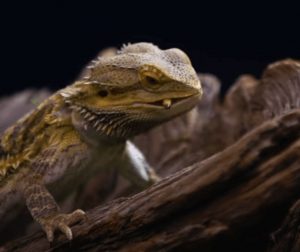
If he runs into difficulties, bathing them can help him relax and poop in the water.
You should prepare a bath with a water temperature of approximately 90 to 95 degrees F (around 32 to 35 degrees Celsius), and massage their belly gently while sliding fingers towards the vent.
Just let them sit in the water for some time and repeat until your dragon has pooped out the mass.
If it doesn’t work, offer them one drop of vegetable or mineral oil.
However, in case none of the methods are working, and your beardie won’t poop for 7 to 10 days, take him to the vet immediately to take an X-ray to see if he has any foreign objects in the stomach or guts.
What to Do If My Bearded Dragon Will Not Poop?
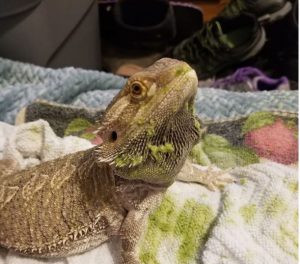
After having a look at some reasons why the bearded dragon is not eating or pooping, you may come up with some ideas to deal with the bearded dragon not pooping.
The first thing you should do is to check the cage setup: lighting, heating, humidity, and the substrate to ensure that everything is okay.
If you suspect ingestion, you should immediately remove the loose substrate.
You should ask yourself, too, whether you give them a healthy and balanced diet and feed them properly, or if you are offering correct greens and properly sized bugs.
Also, you should think about any recent changes in their activity levels and eating tendencies.
If he is not getting better, and the symptoms persist for more than 10 days, take them to the vet.
However, there is a case that the beardie won’t poop because it is brumating, which is normal.
If your beardie won’t poop because he eats little, you should help by soaking them once in 10 to 14 days to make it poop.
Make sure to always help them poop everything out before brumation starts so that he can avoid constipation and food rotting in the guts during brumation.
Read More:
Frequently Asked Questions About Bearded Dragons Not Eating and Pooping
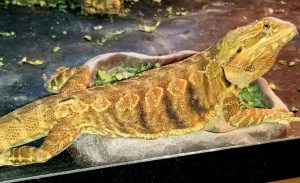
1. How Long Can Bearded Dragons Go Without Pooping?
It is better for them to have a bowel movement at least once per week.
However, regarding impaction, he can go without defecating for several weeks, which can be very harmful to them and result in the death of the animal.
2. Why Does Bearded Dragon Poop Smell So Bad?
If you find the poop smell so awful, he either has parasites (a pretty common occurrence) or he ate something that is just not good for his stomach.
If you have taken some actions such as adjusting his diet, but his stool is still reeking, it’s time for you to have a fecal sample tested for parasites.
3. How Long Can a Bearded Dragon Go Without Eating?
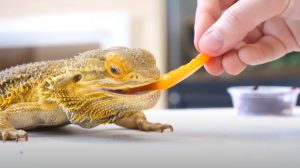
This depends on age, weight, general health, and so on.
But a fully grown healthy dragon can live without food from a few weeks to up to 3 months.
By contrast, younger dragons that need a lot of food for their growth are not able to survive without eating almost every day.
4. Should I Force-feed My Bearded Dragon?
Of course, it is possible for you to force-feed your beardie if there is veterinary approval.
Otherwise, this can have negative impacts such as raising stress.
Conclusion
It would be terrible to find a bearded dragon not eating or pooping. Therefore, I really hope that this article can help you deal with that and that you can take some simple measures to encourage your pet to eat or poop regularly.
If nothing is better, the best option is to take them to a vet and check for health problems.
Key points for why your bearded dragon is not eating or pooping:
When a bearded dragon stops eating or pooping, it’s a cause for concern as these behaviors can be indicative of underlying health issues. Bearded dragons are usually voracious eaters, and regular bowel movements are a sign of their well-being. Here are common reasons for a bearded dragon’s refusal to eat or difficulty with bowel movements:
1. Stress and Environmental Factors:
- Change in environment, habitat, or routine can stress bearded dragons, leading to appetite loss.
- Ensure a stable, stress-free environment and minimize disturbances.
2. Inadequate Temperature and Lighting:
- Incorrect temperature and lighting can disrupt a bearded dragon’s metabolism, causing a loss of appetite.
- Ensure proper temperature gradients and UVB exposure in their enclosure.
3. Illness or Health Issues:
- Respiratory infections, parasites, or other illnesses can affect a bearded dragon’s appetite and digestive system.
- Consult a reptile veterinarian if you suspect health issues.
4. Brumation:
- Bearded dragons may enter a period of brumation, a hibernation-like state where they reduce their activity, eat less, and poop less.
- This is a natural behavior and requires minimal intervention.
5. Mating and Gravidity:
- During the breeding season, females may eat less and become gravid (carrying eggs), which can temporarily affect their appetite.
- Provide a suitable nesting box for egg-laying.
6. Age and Growth:
- Young bearded dragons may eat less during growth spurts, while older adults may eat less due to reduced metabolic rates.
- Adjust their feeding schedule and monitor their weight to ensure they are healthy.
7. Dietary Changes:
- A sudden shift in diet or the introduction of new foods can lead to digestive issues and loss of appetite.
- Gradually transition to a new diet to minimize stress on their digestive system.
8. Impaction:
- Ingesting indigestible materials, like substrate or small objects, can lead to impaction, causing a blockage in the digestive tract.
- Consult a veterinarian for assistance in such cases.
9. Overfeeding or Over-supplementation:
- Excessive feeding or over-supplementation with vitamins and minerals can be detrimental and affect appetite.
- Follow appropriate feeding and supplementation guidelines.
10. Dehydration: – Dehydration can lead to constipation and difficulty passing stools. – Ensure your bearded dragon has access to clean water and maintain proper humidity levels.
11. Behavioral Changes: – Behavioral changes, such as dominance disputes in cohabiting dragons or aggression, can lead to stress and appetite loss. – Address such issues and consider separating bearded dragons if necessary.
12. Hydration and Warm Bathing: – If your bearded dragon appears constipated, a warm bath can help stimulate bowel movements and hydration. – Gently massage their abdomen during the bath to encourage movement.
In summary, when a bearded dragon is not eating or pooping, it’s essential to identify the underlying cause and take appropriate action. Monitoring their behavior, ensuring a proper habitat, and seeking veterinary care when necessary are key steps in addressing these concerns. Prioritizing a healthy diet, consistent environmental conditions, and regular check-ups will help maintain the well-being of your beloved bearded dragon.
Further Reading:
- Carolina Custom Cages Terrarium Review
- 8 Best Basking Rocks for Beardie: What Is the Best Choice?
- 10 Best Thermometers for Beardie: How to Choose the Best One?
- 5 Best Beardie Lighting Setups for Beardie Lovers
- 9 Best Heat Lamps for Beardie: Natural Habitat Provided
- Bearded Dragon Fat Belly: What Should You Do?
- Can Two Bearded Dragons Live Together?
- Signs of MBD in Bearded Dragons
- Why Is My Beardie Breathing Heavy?

